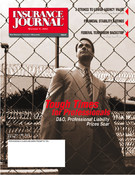Benjamin Franklin wore many hats: statesman, inventor, publisher—even firefighter. In fact, it was his experience fighting fires that made him realize the need to pool financial resources to protect properties and found the nation’s first insurance company 250 years ago.
Since then, the insurance industry has become an integral part of the nation’s economic foundation. Insurance is a necessity—one that few of us enjoy paying for, but one that few of us can afford to be without when the need arises. That point became a shocking reality on Sept. 11, 2001. The events of that day served to remind all of us of an early description of insurance: “The victory of human thought over the rude violence of life.”
The attacks forced all of us to re-examine the role insurance plays in protecting our economy. Is terrorism an insurable event? Can terrorism be predicted? Can models forecast losses? Can a price tag be put on policies to cover terrorism going forward? Or, is terrorism a societal problem, one that the government must ultimately insure?
Right now, victims of terrorist attacks can’t count on the same kind of protection as those of Sept. 11. Global re-insurers are now largely refusing to provide coverage for terrorist events. This has left the U.S. primary insurer, with greatly reduced resources, swaying in the wind. In fact, the property/casualty insurance industry’s policyholders’ surplus declined in the second quarter of 2002 and is now as low as it has been in six years…and moving lower.
In an effort to stay solvent and in business, insurers have been forced to reduce their exposure to this newly perceived risk, writing only very few and very limited terrorism policies. The problem is that the risk is still there. It’s just been shifted from the reinsurers to the insurers and now down to the businesses and people who can’t get terrorism insurance or can’t afford it.
The industry’s latest financial results underline the fact that the need for a federal backstop is ever more urgent. The losses from another terrorist attack on the U.S. currently would fall entirely on the domestic insurance industry given that reinsurers have excluded coverage for terrorism losses.
The industry’s surplus is approximately $284 billion, with less than half that held by commercial insurers who would suffer the brunt of any future surplus losses. Being hit by another terrorist attack of a magnitude similar to the Sept. 11, 2001 event would severely impact their surplus, seriously undermining the industry’s ability to write anywhere near their current level of premium.
The lack of global terrorism reinsurance has also placed workers’ compensation insurance in peril. Now, risks that previously would have been diversified through reinsurance in the world’s financial markets are being concentrated and focused on limited U.S. domestic capital allocated to the workers’ compensation line of insurance.
This is particularly troubling from a public policy perspective because workers’ compensation insurance is intended to assure that funds are available to pay benefits, even if the employer is no longer in business or lacks the resources to pay the costs of an accident. Injured workers must not be left to face financial devastation due to their injury.
Unlike property insurance, workers’ compensation, by law, must provide coverage even in the event of an act of war.
If a terrorism attack occurs that produces casualties of the Sept. 11 magnitude or even greater, some workers’ compensation insurers could become insolvent. State guaranty funds could be overwhelmed by losses, and in some states, employers may be liable for benefits they thought were insured. Injured workers could go unpaid.
The recent agreement reached by key negotiators for the U.S. House and Senate leaderships and the Bush Administration would provide the back-up funding mechanism needed to allow any future losses from terrorism to be paid quickly and fully.
A federal backstop will help stabilize the private insurance market, not replace it. By creating an upper limit of loss, a backstop would define the risk and make it possible to appropriately allocate and price it. The Alliance believes that this legislation is a true example of public/private sector cooperation and good public policy.
Only the federal government has the resources to effectively backstop insurers so that they can provide the terrorism risk coverage America needs. The pending legislation to provide that government backstop will protect the solvency of insurers so that they can continue to insure terrorism losses as well as provide money to help pay for any future large terrorist attacks.
As Congress considers this legislation we all should support their efforts to create good economic policy for these uncertain times. As Ben Franklin noted when founding that first insurance company, “An ounce of prevention is worth a pound of cure.”
Rodger S. Lawson, Ph.D., is president of The Alliance of American Insurers. Based in Downers Grove, Illinois, the Alliance is a national trade association representing more than 340 property/casualty insurance companies.
Topics Catastrophe USA Natural Disasters Carriers Legislation Workers' Compensation Reinsurance Market
Was this article valuable?
Here are more articles you may enjoy.


 US Appeals Court Rejects Challenge to Trump’s Efforts to Ban DEI
US Appeals Court Rejects Challenge to Trump’s Efforts to Ban DEI  Insurance Broker Stocks Sink as AI App Sparks Disruption Fears
Insurance Broker Stocks Sink as AI App Sparks Disruption Fears  What Analysts Are Saying About the 2026 P/C Insurance Market
What Analysts Are Saying About the 2026 P/C Insurance Market  Trump Demands $1 Billion From Harvard as Prolonged Standoff Appears to Deepen
Trump Demands $1 Billion From Harvard as Prolonged Standoff Appears to Deepen 


